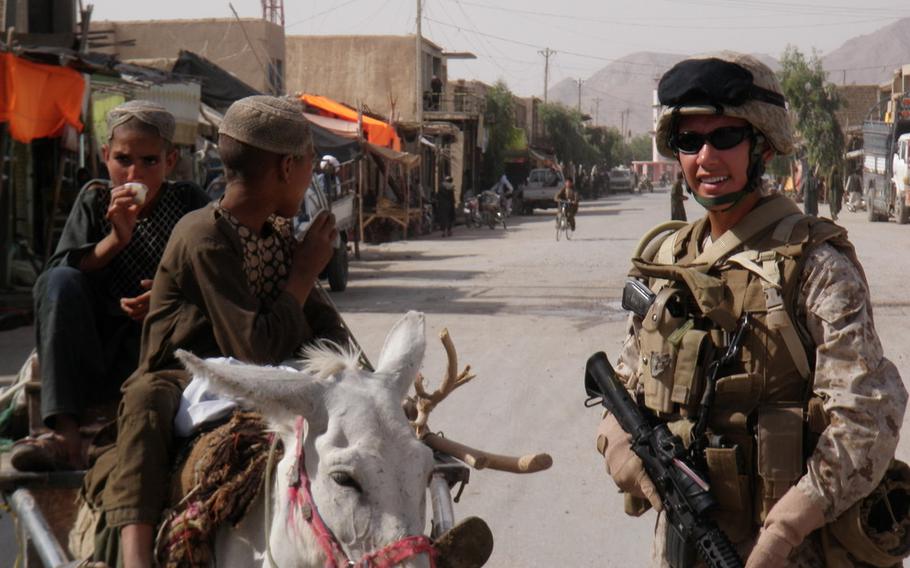
Juliana Mercer, who served in the Marine Corps for 15 years, is shown in Helmand, Afghanistan, in 2010. She works now with a nonprofit advocating for MDMA-assisted therapy. (Juliana Mercer )
WASHINGTON — The Department of Veterans Affairs has issued a request for applications for clinical trials of psychedelic-assisted therapies using magic mushrooms and ecstasy to treat post-traumatic stress disorder and depression.
The plans represent the first time since the 1960s that the VA plans to test the safety and effectiveness of specific hallucinogenic drugs in the mental health treatment of veterans, the VA said.
With the suicide rate for veterans nearly double that of the general population, veterans groups and policymakers are calling on the VA to investigate alternative treatments for addressing PTSD, a mental health condition that veterans who have been in combat or were injured often experience and increases their suicide risk.
Psychedelic-assisted treatment, which has shown positive outcomes in privately funded clinical studies, is seen as a viable solution.
“Veterans and VA researchers have told us about the potential promise of psychedelics to treat mental health conditions for some time,” Shereef Elnahal, the VA undersecretary for health, said Friday in a formal statement when the VA disclosed plans for the study.
While the VA has used “non-VA funds” for limited, small studies at VA facilities for psychedelic-assisted therapies, the new effort involves VA funding a large-scale trial on the effectiveness and safety of the compounds as mental-health treatment.
“This is tremendous progress for the VA, made possible by working closely with Secretary [Denis] McDonough and the House Committee on Veterans’ Affairs’ commitment to finding better solutions for our veterans,” said Rep. Morgan Luttrell, R-Texas, who was a Navy SEAL.
The VA’s plans also have support from the American Legion, the Disabled American Veterans and other veterans’ groups, which have been advocating for the veteran-specific studies.
Veterans will receive treatments in medically supervised settings, in addition to mental-health counseling, to address symptoms of PTSD and depression related to their military service.
The VA said funding for the research reflects its commitment to exploring unconventional therapies to alleviate symptoms in veterans that counseling and traditional medicine have failed to adequately treat.
Veterans increasingly are seeking psychedelic-assisted therapies to address persistent negative thoughts, flashbacks, depression and mood swings resulting from life-threatening experiences and injuries from their military service.
Juliana Mercer, a retired Marine Corps sergeant who served in Iraq and Afghanistan, welcomed the VA’s announcement as a “historic event for those, like me, who have experienced these compounds’ life-saving potential.”
Mercer, who served in the Marine Corps from 2001-2016, directs veteran advocacy and public policy at Healing Breakthrough, a California nonprofit that supports MDMA-assisted treatment for veterans.
The VA’s decision, Mercer said, “is the culmination of tireless efforts of veteran advocates, bipartisan legislators, VA clinicians and researchers, and philanthropists who are determined to end the veteran suicide epidemic.”
Psilocybin and MDMA are classified as Schedule 1 drugs under the Controlled Substances Act, which means they are illegal under federal law and have been determined to have no current acceptable medical use. VA officials said they will undertake the research with regulatory approvals from the Food and Drug Administration and the Drug Enforcement Administration,
The Defense Department also plans a separate study of psychedelic-assisted therapy and cannabis medical treatment for service members with PTSD and traumatic brain injuries.
The military research and clinical trials will receive $10 million in funding, under provisions of the fiscal 2024 National Defense Authorization Act that Congress approved.
For the VA research, scientists will collaborate with universities to examine the potential mental health benefits of psilocybin, commonly known as magic mushrooms, and MDMA, or methylenedioxymethamphetamine, also known as ecstasy.
The VA’s decision to advance research on psychedelic-assisted therapies follows a September meeting with federal clinicians, scientists and policymakers that focused on the body of research on psychedelic-assisted therapies for PTSD and depression.
“This meeting’s working groups provided advice to VA leadership, including the recommendation for VA to begin funding its own studies into these compounds,” the VA said.
Recent research includes work by Johns Hopkins University showing positive outcomes among study participants, the VA said. However, most of the current research has involved few or no veterans as participants.
“Veterans themselves play an integral role in the VA research program,” according to information on the VA Office of Research and Development website. “Thousands of VA patients volunteer each year to participate in VA research studies, both to address their own health challenges and to help their fellow veterans, now and in the future.”
The VA does not publicly disclose details of funding for various grant initiatives, which are shared with VA investigators only, according to the VA.
Requests for applications are formal solicitation notices announcing the availability of grant funding by government agencies to qualifying recipients. RFAs often are the first step in initiating research, projects and programs.
There will be three funding cycles resulting from this RFA, the VA said Monday. The first funding decision is expected after the conclusion of the peer-review process planned for August 2024.
A 2022 study published in the National Library of Medicine noted “after several decades when research into psychedelics was effectively halted by federal legislation, the past several years has shown the re-emergence of thoughtful investigations studying the utility of compounds.”
Improvement in patient symptoms “seem unlike the improvements seen in the currently available care paradigms,” the study concluded.